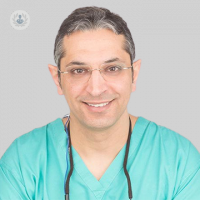Minimal access spinal surgery: What are the advantages?
Written in association with:Minimal access spinal surgery is an alternative approach to traditional open surgical procedures that is carried out to treat spinal pathologies, with the goal of stabilising bones and joints and relieving nerve pressure.
Here to provide an expert insight into minimal access spinal surgery, including its advantages and its effectiveness, is Mr Khalid Salem, distinguished consultant orthopaedic spinal surgeon.

What is minimal access spinal surgery?
Minimal access spinal surgery is a technique implemented to achieve the same objectives obtained with open spinal surgery, but through minimal disruption (smaller incisions) of the muscle envelope that surrounds the skeleton and the nerves.
The idea behind minimal access spinal surgery is that with minimum trauma to the muscle, post-operative pain can be reduced and recovery can be improved.
What conditions can minimal access spinal surgery treat? Who is a good candidate for the procedure?
This technique can be used to treat most degenerative (wear-and-tear) spinal pathologies. There is no clear restriction to its use with regards to age.
How is minimal access spinal surgery performed?
The technique has been powered with the use of the microscope, tubular retractors, complex approaches in surgery and, more recently, the invention of endoscopic surgery also performed in the spine.
Is minimal access spinal surgery painful?
Like with all types of surgery, minimal access surgery causes pain, but the amount is much lower than what open techniques cause, helping with a quicker recovery and easier rehabilitation.
What are the possible complications of minimal access spinal surgery?
The complication profile of minimal access spinal surgery is no different from that experienced with open spinal surgery.
The advantage of minimal access spinal surgery is that it minimises post-operative pain and improves recovery. This must always be kept in mind when taking or making a decision on minimal access spinal surgery.
How successful is minimal access spinal surgery at treating spinal conditions and spinal pain?
As long as the diagnosis of the underlying pathology is accurate and the technique is able to achieve a good resolution of this pathology, the success rate of spinal surgery through a minimally invasive approach is as good as that of an open technique.
What is recovery like?
Recovery is where minimal access spinal surgery is at its best: reducing pain, making recovery easier, and leading to a quicker rehabilitation. It is one of its main advantages.
If you are considering minimal access spinal surgery and you wish to consult your options with an expert, do not hesitate to book an appointment with Mr Khalid Salem via his Top Doctors profile today.


